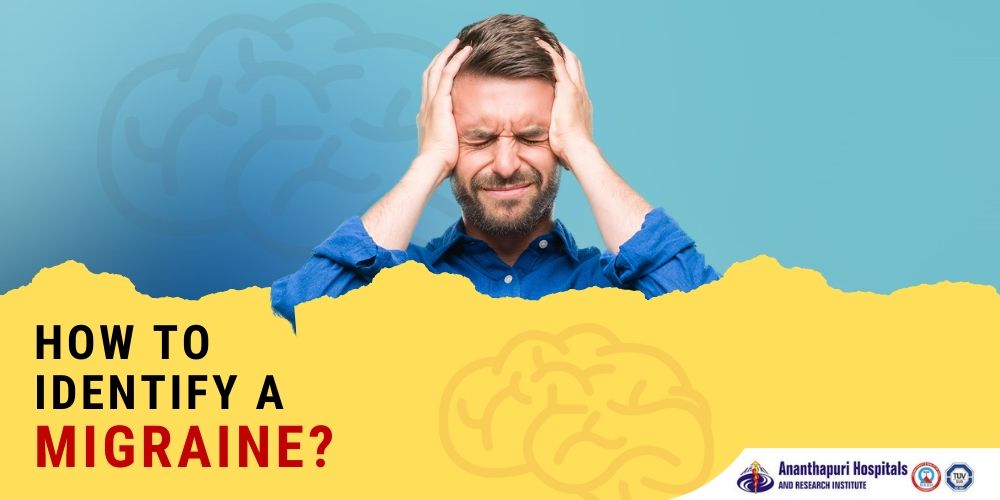- 05/November/2019

Migraine or a Headache? Causes, Symptoms and Treatment for Migraines - Ananthapuri Hospitals
“My headaches always end in vomiting!”
“When I get a headache, I can’t even move”
“It feels like one side of my head is going to explode”
“If I get a headache, I need to lie down in a dark room”
“It feels like I am going to die”
If you feel this way about your headache, it is probably a migraine attack!
Migraines are very, very different from headaches. Yes, both migraines and headaches cause pain. But migraines can be accompanied with other symptoms like nausea, vomiting and sensitivity to bright lights and loud noises. During a migraine, the pain can be so extreme that it stops you from doing your daily activities.
WHAT IS A MIGRAINE?
A migraine can be classified as a neurological disease. A migraine is a headache with extreme pain and other symptoms like nausea.
WHAT ARE THE SYMPTOMS OF A MIGRAINE?
Migraines are headaches with extreme and severe pain, often preventing a person from doing all their routine activities. The pain can be so bad that is can be described as ‘disabling’
These are the symptoms of a migraine
- You have an extreme headache that is throbbing or pulsing
- Your pain is on one side of your head or one eye
- Your pain lasts between 4 hours and 3 days
- Your pain increases when you are exposed to light and sound. So you feel the need to be in a dark and quiet room
- You feel nauseated
- You end up vomiting
- You feel faint
- Your vision becomes blurry
WHAT CAUSES MIGRAINES?
Unfortunately, the cause of a migraine is not discovered yet.
However, a migraine can be ‘triggered’ by many things. A trigger is any event or stimulus that seems to set off a migraine.
The current theory is that these triggering factors cause a neurovascular event called ‘cortical spreading depression’. As a consequence of this cortical spreading depression, the blood vessels in the brain start to narrow and dilate, which directly causes a migraine.
It is not very easy to identify what is triggering your migraine! Especially if your migraines are linked to a number of different things. So you need to keep a close eye on what goes on in your life, especially before a migraine attack.
Here are some common triggers:
- Hormonal changes, for instance during menstruation
- Emotional triggers: Stress, depression, anxiety, excitement, and shock
- Physical tiredness or overexertion
- Low blood sugar
- Jet lag
- Dietary triggers, like chocolate, cheese or citrus fruits
- Dehydration
- Medications like sleeping pills or hormone replacement therapy (HRT) medications
- Environmental triggers like bright lights, flashing screens, strong scents, smoke, and loud noises
IS MIGRAINE CURABLE?
We have good news and bad news.
The bad news is that there is NO SINGLE CURE for migraines
The good news is that there are many medicines and methods to reduce the symptoms and prevent a full-blown migraine attack.
WHAT IS THE TREATMENT FOR A MIGRAINE?
As said earlier, migraine medications do not cure migraines.
So what do migraine medicines do? They treat the symptoms.
When you are going through a migraine attack, you can rely on simple pain killers.
Read this once more: Your medication provides relief from your migraine. It does not cure the actual physiological processes behind your migraine.
WHAT IS THE BEST THING TO DO FOR A MIGRAINE?
There is no one-size-fits-all remedy for migraines, but here are the recommendations to manage your migraine attack
- Rest: When your migraine starts, do your best to stop all routine activities
- Darkness: Migraines often turns extreme if you are exposed to light. So turn off the lights
- Medication: Take a painkiller
- Silence: Migraines are also often accompanied with increased sensitivity to sound. So it’s best to sit in a room that’s dark and also quiet
- Sleep: Try to sleep
- Temperature: Try applying either hot or cold packs on your head and neck. The cold pack may have a numbing effect. The hot pack may have a relaxing effect. See what works for you
- Caffeine: Drink small amounts of caffeinated beverages, like tea or coffee. Make sure you don’t drink too much caffeine, because it can lead to other headaches later!
Over time, you will know what is the best way to manage your migraine. Eventually, you will be able to sense the triggers and prevent it from becoming a full-blown migraine attack.
WHAT IS A MIGRAINE AURA?
Some of you may have noticed a very peculiar thing - a few hours before your migraine attack, you can predict it! You know that the pain is coming. This is called a migraine aura. 25% of all migraine attacks are preceded by an aura.
- You experience some loss of vision in one or both eyes
- You see criss-cross patterns in your vision
- You see flashing lights
- You see, hear, or smell things that aren't really there (hallucinations)
- You feel prickling, tingling sensations, or experience numbness
- You have trouble speaking
Remember, only a quarter of all migraine attacks are accompanied by an aura.
HOW LONG DO MIGRAINES LAST?
A migraine attack can last between 4 hours and 3 days
DO YOU NEED TO SEE A DOCTOR FOR MIGRAINES?
In case your headaches are new, and if your headaches are accompanied by weakness or dizziness, you should see a doctor. A doctor's evaluation can rule out other serious neurological conditions.
The Department of Neurology of Ananthapuri Hospitals has experienced medical professionals who are experts in managing and treating various neurological disorders. To book an appointment, call us at +91 9400332777 or visit our hospital at Chacka, NH Bypass, Thiruvananthapuram.

